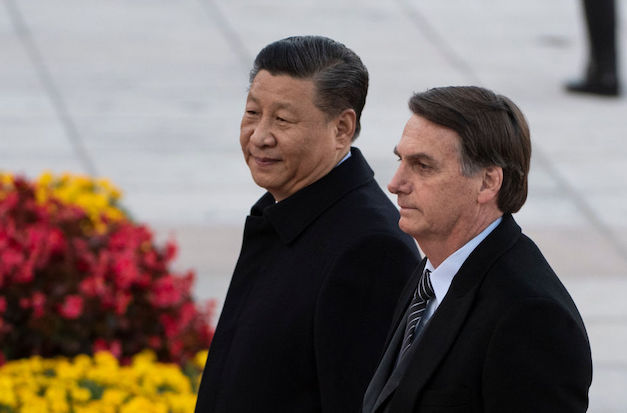Brazil’s Jair Bolsonaro and his Chinese counterpart will meet face-to-face this week, and for the second time in fewer than two months, as BRICS leaders descend on Brasília for the group’s 11th summit. As host, Brazil is breaking yet another foreign relations tradition: Bolsonaro decided to cancel the so-called BRICS outreach, a parallel program where regional leaders are invited by the host country to engage with the BRICS presidents. Bolsonaro refused to organize such a gathering without Venezuela’s Juan Guaidó, whom none of the other BRICS leaders recognize as president. The move was privately criticized by diplomats from the other BRICS countries, who after traveling all the way from Beijing, Moscow, Delhi and Pretoria, would have liked to meet the largest number of South American leaders possible. But despite the cancellation, the summit goes on. Xi will be in attendance, and the Brazil-China bilateral relationship will remain as strong as ever.
This is remarkable, considering that Bolsonaro’s election victory in 2018 was meant to initiate a period of crisis in the bilateral relationship with China, which has been Brazil’s most important trading partner since 2009. As a candidate, the former army captain visited Taiwan and announced that he planned to break the “friendly-with-communist-regimes” approach of previous Brazilian governments. Once in office, Bolsonaro implemented the most radical foreign policy change in living memory and sought near-automatic alignment with the Trump administration. Chinese and Brazilian business groups and diplomats worried that the shift could seriously damage trade and investment ties.
Enter the pragmatists of Brazil’s government. In a carefully coordinated effort, Vice President Hamilton Mourão, Minister of Agriculture Tereza Cristina and Economy Minister Paulo Guedes — individuals often described as the “adults in the room” in the Bolsonaro administration — assured China that the president’s verbal attacks on Beijing and admiration for Trump would not derail Brazil-China ties. Mourão in particular dedicated a significant part of his time and energy during the first six months of 2019 to undoing early damage — a move that created tensions between him and the pro-Trump faction in Brazil’s government, and led radical Bolsonaro supporters to accuse the vice president, an arch-conservative general, of being a closet communist.
The success of the “adults” approach was on full display in October, when Bolsonaro walked the red carpet next to Xi in Beijing, and deemed China a “very capitalist country.”
Three reasons help explain why the pragmatists succeeded: First, the China-Brazil trade and investment relationship is mutually beneficial and undermining it would have hurt Brazilian farmers, an important part of Bolsonaro’s constituents who knew from the start that his talk of signing a trade deal with the United States was delusional. After all, the U.S. is unlikely to allow Brazilian agricultural products to freely compete with those produced by U.S. rural voters. Second, conjuring up the China threat simply failed to resonate with Brazilian voters. And finally, in contrast to several leaders in the Western Hemisphere and Europe who readily criticized the Brazilian president — ranging from Alberto Fernández and Nicolás Maduro to Bill de Blasio and Emmanuel Macron — Xi and other Chinese officials were careful to never respond to Bolsonaro’s attacks, thus avoiding the verbal mud-slinging Brazil’s president uses to mobilize his key supporters.
In the grand scheme of things, Bolsonaro doesn’t matter much to Chinese policymakers, who think about the relationship on a 20-30 year horizon, and who are aware not only that Brazil depends on China, but that China will always depend on Brazilian commodities. Behind the scenes, China has adroitly used its economic firepower to its diplomatic advantage. Aware that attracting foreign firms to place a bid in Brazil’s much-anticipated early November oil auction would be difficult, Bolsonaro asked Xi for help. The Chinese president promptly delivered: CNOOC and CNODC, two Chinese state oil companies, ended up being the only foreign bidders, helping the Brazilian president save face after the auction failed to meet expectations. Beijing has also learned to provide diplomatic support to partners in distress. When Brazil found itself the target of global outrage for doing too little to combat the Amazon fires in August, the Chinese government took the opposite strategy and publicly lauded Brazil’s environmental record. China, the underlying message was, is a true all-weather friend.
All that is meant to counter overt U.S. pressure on Bolsonaro to exclude China’s telecommunication giant Huawei from next year’s 5G spectrum auction. Along with India, Brazil’s auction may be one of the world’s most important, and their decision about whether to allow Huawei to participate will have an impact on the global battle between China and its rivals.
When Bolsonaro and Xi meet again in Brasília for the 11th BRICS Summit, the Chinese president is likely to privately condition large-scale investments and credits to Brazil on Bolsonaro’s commitment not to ban Huawei from the auction — a step that would all but guarantee the Chinese company to be chosen, given its more competitive prices. It doesn’t help the United States that, in Brazilian courts of public opinion, Bolsonaro’s pro-Trump stance is increasingly seen as a case of unrequited love, and that the Trump administration has given Bolsonaro little in the way of concrete concessions — such as better access to the U.S. market or the participation of U.S. firms in the auction of deep-sea oil — that he can boast about at home. That may be because there are growing doubts in Washington about Bolsonaro’s capacity to deliver the only thing that Trump really cares about in Latin America: limiting Chinese influence.
The Trump-Bolsonaro bromance may fizzle. Should Trump lose re-election next year, the Brazilian president will find himself isolated in the West — and rely more on China and the BRICS than he ever imagined when he decided to run for president.








